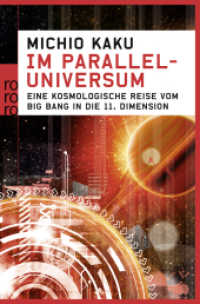- ホーム
- > 洋書
- > 英文書
- > Cinema / Film
Full Description
Re-examines notions of East and West in contemporary European cinema
Twenty-five years have passed since the fall of the Berlin Wall and the end of communism in Eastern Europe, and ten years have passed since the first formerly communist states entered the E.U. An entire post-Wall generation has now entered adulthood, yet scholarship on European cinema still tends to divide the continent along the old Cold War lines.
In East West and Centre the world's leading scholars in the field assemble to consider the ways in which notions such as East and West, national and transnational, central and marginal are being rethought and reframed in contemporary European cinema. Assessing the state of post-1989 European cinema, from (co)production and reception trends to filmic depictions of migration patterns, economic transformations and socio-political debates over the past and the present, they address increasingly intertwined cinema industries that are both central (France and Germany) and marginal in Europe (Romania, Bulgaria, Lithuania).
This is a ground-breaking and essential read, not just for students and scholars in film and media studies, but also for those interested in wider European studies as well.
Contents
List of Figures Notes on Contributors Acknowledgements
Introduction: East, West and Centre: 'Mapping Post-1989 European Cinema' Michael Gott and Todd Herzog
Part I Redrawing the Lines: De/Recentring Europe
1 The Berlin Wall Revisited: Reframing Historical Space Between East and in Cynthia Beatts's Cycling the Frame (1988), The Invisible Frame (2009) and Bartosz Konopka's Rabbit à la Berlin (2009) Jenny Stümer
2 Changing Sides: East/West Travesties in Lionel Baier's Comme des voleurs (à l'est) Kris Van Heuckelom
3 Dubbing and Doubling Over: The Disorientation of France in the Films of Michael Haneke and Krzysztof Kieślowski Alison Rice
4 Challenging the East-West Divide in Ulrich Seidl's Import Export (2007) Nikhil Sathe
5 Fatih Akın's Filmic Visions of a New Europe: Spatial and Aural Constructions of Europe in Im Juli/In July (2000) Berna Gueneli
6 Salami Aleikum - The 'Near East' Meets the 'Middle East' in Central Europe Alexandra Ludewig
7 Cinematic Fairy Tales of Female Mobility in Post-Wall Europe: Hanna v. Mona Aga Skrodzka
Part II Border Spaces, Eastern Margins and Eastern Markets: Belonging and the Road to/from Europe
8 Contemporary Bulgarian Cinema: From Allegorical Expressionism to Declined National Cinema Temenuga Trifonova
9 The Point of No Return: From Great Expectations to Great Desperation in New Romanian Cinema Lucian Georgescu
10 'Weirdness', Modernity and the Other Europe in Attenberg (2010, Athina Rachel Tsangari) Jun Okada
11 Lithuania Redirected: New Connections, Businesses and Lifestyles in Cinema since 2000 Renata Šukaitytė
12 Lessons of Neo-liberalism: Co-productions and the Changing Image of Estonian Cinema Eva Näripea
13 Decentring Europe from the Fringe: Reimagining Balkan Identities in the Films of the 1990s Danica Jenkins and Kati Tonkin
Part III Spectres of the East
14 Through the Lens of Black Humour: A Polish Adam in the Post-Wall World Rimma Garn
15 East Germany Revisited, Reimagined, Repositioned: Representing the GDR in Dominik Graf's Der rote Kakadu (2005) and Christian Petzold's Barbara (2012) Nick Hodgin
16 Barluschke: Towards an East-West Schizo-History Kalani Michell
17 The Limits of Nostalgia and (Trans)National Cinema in Cum mi-am petrecut sfârşitul lumii (2006) Mihaela Petrescu
18 The Ideal of Ararat: Friendship, Politics and National Origins in Robert Guédiguian'sLe Voyage en Arménie Joseph Mai
Notes Bibliography Index








